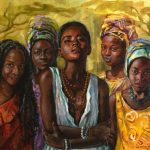By Million Belay, AFSA General Coordinator
I just came back from a week-long stay in DRC. I was expecting to see a city intermingled with small forest areas. I did not see a single forest. You land in Kinshasa, which someone told me is the heart of the Congo, travel through a forest of people, where almost everything in a crowded city happens, and then eventually arrive at a somewhat cleaner part of the city. This is where most meetings take place. You have to travel out of central Kinshasa to see the forest. As we were busy, I only managed to see the river when I went up to the meeting hotel’s ninth floor. You can see the famous Congo River in all its regalia, passing through the city’s outskirts. While we were travelling to the President’s office to speak to his agricultural advisor, someone pointed out to me that on the other side of the river is Congo Brazzaville. You can see the towering buildings across the river.
I was part of the team that organized a convening to explore the relationships between climate change, biodiversity conservation and food systems. I might have pushed the idea of the Congo Basin meeting and raised funding for it, but many people put their energy into the success of this meeting. Five local organizations worked day and night to navigate their country’s bureaucracy, politics, and logistics to make it happen. AS ALWAYS, the AFSA working group on Citizens and the AFSA staff team were excellent. Some partners took a keen interest in the meeting and supported fundraising.
The Congo, for me, represents all the crimes committed, and still being committed, by outside actors, in cohort with local elites and thieves, in Africa, only much more. Genocide, exploitation, theft, extraction of resources, destabilising the country’s politics, you name it. People get sick and die, producing minerals for our smartphones. I am not sure how many of us know that half of the population of the Congo, between 5 and 10 Million people, died as a result of colonial exploitation under the rule and administration of King Leopold II and his functionaries.
There is a deluge of funding flowing into the Region, mainly for conservation. We wanted to explore how this funding helps the transition to sustainable and healthy food systems, having people at the centre in the context of the climate crisis.
I knew the Congo Basin to be critical, but I did not know that it could be more important in some aspects to the world than the Amazon. I heard during the meeting that even though both the Congo Basin and the Amazon Rainforest are incredibly important ecosystems with unique roles in climate change mitigation and adaptation, the Congo Basin is \more important as a carbon sink. The Congo Basin’s significance lies in its rich biodiversity, often called the “second lung of the planet,” and its role in regulating local and regional climate patterns in Central Africa. The Congo River and its tributaries provide vital water resources for thousands of communities, enhancing their resilience to climate impacts. Additionally, the Congo Basin’s ecosystems are less studied than the Amazon, making it a potential area for new insights. Congo Basin’s exceptional biodiversity and contributions to climate regulation underscore its importance alongside the Amazon Rainforest.
We were expecting 150 participants, but we ended up having more than 200. It was a huge meeting: Participants mainly came from the six Congo Basin countries: the Democratic Republic of Congo, Central Africa Republic, Cameron, Gabon, Equatorial Guinea, and the Republic of the Congo (Congo Brazzaville). The majority were from the DRC. They came from all corners of the DRC. DRC is the biggest country in the basin, and most of the forest is there.
The convening was designed to have few PowerPoint presentations and much more of group discussions, for the participants to come up with their agenda moving forward. And come up, they did. Participants were asked to put forward their burning issues and opportunites in relation to the meeting’s theme. Over 49 ideas were presented and were grouped into nine thematic categories: Agroecological entrepreneurship; capacity building in agroecological practices; women empowerment for agroecological tradition; strengthening communities and indigenous peoples as part of the agroecology transition; research and document on agroecology; restoration of ecosystems and biodiversity; promoting consumption of local products; advocacy for policies and frameworks conducive to food sovereignty and agroecology; and strengthening youth movements as part of the agroecology transition. Each of the nine groups developed a clear plan, identifying in detail the partners that they want to work with and choosing a coordinator for each of these working groups. The nine leaders will soon meet to move things forward. Interestingly, almost all of what they decided to do corresponds with what AFSA is already doing, making the relationship even stronger.
The meeting came up with the Kinshasa declaration, which was submitted to the Secretary-Generals of the ministries of agriculture, environment and youth. We also submitted the declaration to the agriculture advisor of the President.
I feel hopeful that this initiative will work for many reasons, including the participation of the government and their endorsement of the Kinshasa declaration. We had key actors from DRC but also from the wider Congo Basin who we hope will keep the fire burning. It was a most demanding and expensive meeting, but it felt so deserving when it ended.
Email: million.belay@afsafrica.org

































